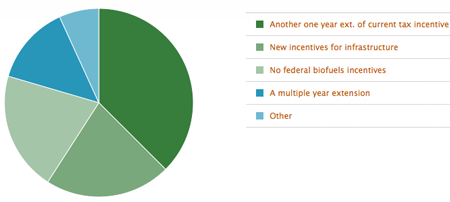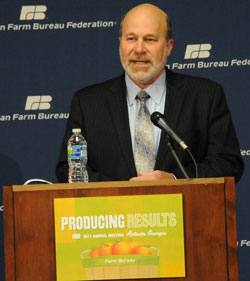The United States Department of Agriculture (USDA) released its final report on the total 2010 corn crop and supply and well as its updated estimates of corn use. The total 2010 corn production was 12.45 billion bushels, the third largest crop in U.S. history.
 There were some unanticipated changes in the report as well. First, the corn yield was lower – 152.8 bushels per acre but overall, this is still the 4th highest. The reduction in yield was offset by the addition of 100,000 harvested acres. Second, the USDA increased its demand forecast to 4.9 billion bushels for the marketing year that runs from September 1, 2010 through August 31, 2011. This should equal ethanol production of nearly 13.5 billion gallons. When taking into account the contribution of distillers grains and other feed co-products of ethanol production, USDA lowered its livestock feed usage by 100 million bushels.
There were some unanticipated changes in the report as well. First, the corn yield was lower – 152.8 bushels per acre but overall, this is still the 4th highest. The reduction in yield was offset by the addition of 100,000 harvested acres. Second, the USDA increased its demand forecast to 4.9 billion bushels for the marketing year that runs from September 1, 2010 through August 31, 2011. This should equal ethanol production of nearly 13.5 billion gallons. When taking into account the contribution of distillers grains and other feed co-products of ethanol production, USDA lowered its livestock feed usage by 100 million bushels.
Ending stocks of corn were reported at 745 million bushels, down from last month’s report.
The Renewable Fuels Association (RFA) took time to analyze the report and determine how it may impact the ethanol industry. They stated, “While not as large as originally thought, the 2010 corn crop is quite robust considering the challenges much of the Corn Belt endured. With the 4th highest yields and 3rd largest crop on record, American farmers once again demonstrated their ability to produce a safe and abundant corn supply.”
RFA also noted that USDA kept their ethanol production estimates for the 2010/2011 marketing year in line with industry expectations. The organization also thinks it highly unlikely that the USDA will reverse their numbers in the future, especially in a higher direction due to the constraints of the E10 blend wall and the anticipated slow adoption of E15 ethanol blends.Read More







 The
The  “Part of that is the recognition that maybe that blend credit isn’t serving as good a purpose as it could and the fact that it is a pot of money that may be subject to budget reductions and if we could shift that to infrastructure you can make the case that its a better use of public funds,” Stallman added.
“Part of that is the recognition that maybe that blend credit isn’t serving as good a purpose as it could and the fact that it is a pot of money that may be subject to budget reductions and if we could shift that to infrastructure you can make the case that its a better use of public funds,” Stallman added.

